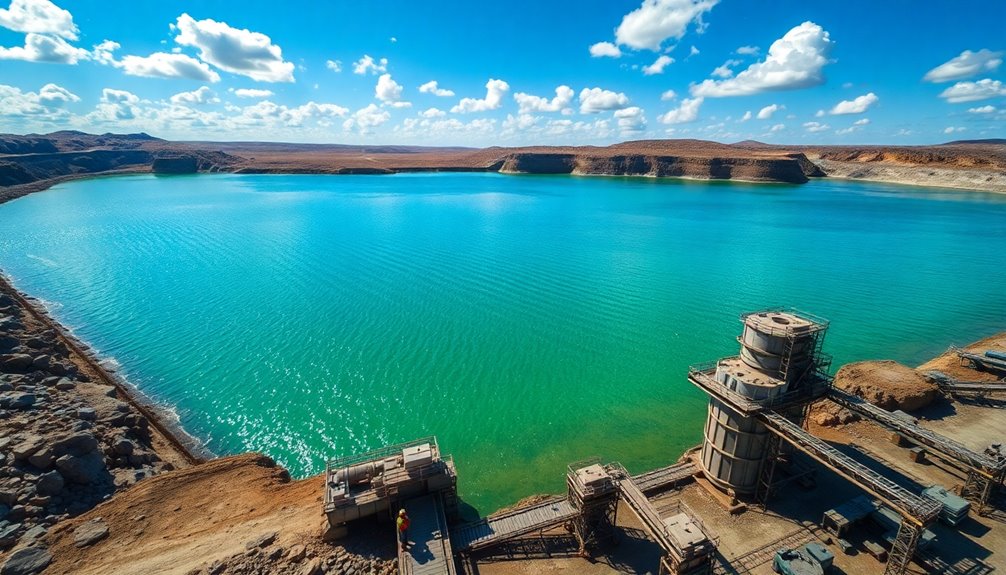A mining pool is a group of miners who combine their computational power to improve their chances of successfully mining cryptocurrency blocks. By pooling resources, you can share the workload and increase your odds of earning rewards. Each member gets paid based on their contribution, often calculated using payout structures like Pay-Per-Share (PPS) or Pay-Per-Last-N-Shares (PPLNS). While joining a pool can lead to more consistent earnings, be mindful of potential fees and centralization risks. If you're curious about how to choose the right pool for you, there's plenty more to explore in this topic.
Key Takeaways
- A mining pool is a group of miners combining their computational power to increase the chances of successfully mining blocks.
- Mining pools distribute block rewards based on each miner's contributed hashing power, enhancing earning potential.
- Common payout structures in mining pools include Pay-Per-Share (PPS) and Pay-Per-Last-N-Shares (PPLNS).
- Established mining pools, like Slush Pool and F2Pool, dominate the Bitcoin network hashrate, affecting decentralization.
- Joining a mining pool makes cryptocurrency mining more accessible for smaller miners, reducing earnings variance.
Mining Pool Fundamentals Explained

Mining pools are a game changer in the world of cryptocurrency mining. They allow miners to combine their computational resources, increasing the chances of successfully mining a block.
When a pool mines a block, the block reward is distributed based on each miner's hashing power, making it a more reliable income source compared to solo mining. Various payout schemes, like Pay-Per-Share (PPS) and Pay-Per-Last-N-Shares (PPLNS), cater to different preferences among miners.
Operating under the proof-of-work consensus mechanism, mining pools help reduce variance in earnings.
However, as a few large pools dominate the Bitcoin mining landscape, concerns about centralization and its effects on network security have arisen, raising questions about fairness within the ecosystem.
Mining Pool Overview and Significance

Collaborating in a mining pool can significantly enhance your chances of earning rewards in the competitive world of cryptocurrency mining.
Mining pools allow you and other crypto miners to combine your computational power, increasing the likelihood of successfully mining blocks on Proof of Work networks like Bitcoin. Instead of relying on solo mining, which can be unpredictable, you share rewards based on your contributed hashrate, making it more accessible for smaller miners.
Established pools like Slush Pool, F2Pool, and Poolin dominate the Bitcoin network hashrate, showing the significance of teamwork.
Mining pools also employ various payout structures, such as Pay-Per-Share (PPS) and Pay-Per-Last-N-Shares (PPLNS), which directly impact your overall profitability and reward distribution.
Reward Distribution Mechanics

Understanding the mechanics of reward distribution in mining pools is crucial for maximizing your earnings.
Different payout structures, like Pay-Per-Share (PPS) and Pay-Per-Last-N-Shares (PPLNS), play a significant role in how miners receive their rewards.
With PPS, miners receive fixed payments for each share submitted, providing consistent income. In contrast, PPLNS rewards depend on the last N shares submitted, encouraging loyalty to the pool.
Proportional payout methods distribute rewards based on the total shares contributed relative to the total shares submitted before a block is mined.
Keep in mind that fees, ranging from 0% to 5%, can impact your miner profitability.
Regularly assessing pools that align with your earning strategies is essential in crypto mining.
Pros and Cons Summary

While joining a mining pool can enhance your chances of successfully mining blocks, it's essential to weigh the pros and cons.
Mining pools allow you to combine computational power, making it easier for you to participate in the competitive mining environment. You'll benefit from more predictable earnings since payouts are based on your contributed hash power.
However, shared rewards mean your individual earnings might be lower than if you mined solo. Centralization is also a concern; large mining pools can dominate the network, undermining cryptocurrency's decentralized nature.
Additionally, pool fees can eat into your profitability, so the reliability of the pool operator is crucial. Mismanagement or fraud can significantly impact your earnings, so choose wisely.
Mining Pool Types Overview

Mining pools come in various types, each with its own payout structures and operational methods.
For instance, Pay-Per-Share (PPS) guarantees fixed payouts for every share submitted, while Pay-Per-Last-N-Shares (PPLNS) rewards you based on your last N shares, promoting longer participation.
Proportional mining pools distribute rewards according to the shares you contribute relative to the total.
Hybrid mining pools offer flexibility, combining different payout methods to match your risk tolerance and strategy.
If you prefer decentralization, Peer-to-Peer mining pools enhance transparency by eliminating a central authority.
Lastly, solo mining pools allow individuals with significant computational power to claim the entire block reward, appealing to those ready to take on more risk.
Pool Operator Reliability Issues

Choosing a reliable pool operator is essential for your success as a miner, since mismanagement or fraud can lead to significant losses.
Pool operator reliability hinges on transparent practices and regular performance assessments that help identify risks.
With the rise of large mining pools, concerns about centralization and unreliable operators become more pronounced, as they can manipulate reward distributions, leading to variable payouts.
To avoid the pitfalls of poorly managed pools, you need to conduct thorough research and pay attention to user reviews.
Trust in a pool operator often stems from a history of consistent payouts and clear communication.
Beware of pools that exhibit opaque operations, as they may pose higher risks to your mining success.
Decentralized Mining Pool Emergence

As concerns about centralization in the cryptocurrency space grow, decentralized mining pools have emerged as a promising solution.
These pools, like P2Pool, help mitigate centralization risks by allowing you, the crypto miner, to operate without a central authority. This enhances transparency and reduces the potential for fraud.
By submitting shares to a sidechain, you maintain control over your resources, while ensuring that your hashing power contributes to a distributed network.
Decentralized mining pools encourage direct payouts, minimizing intermediary risks and fostering a fairer rewards distribution.
As more miners seek autonomy and a stake in a decentralized future, these pools are gaining traction, promoting a more resilient and equitable mining ecosystem.
Consider Community Reputation Ratings

When evaluating a mining pool, considering community reputation ratings can greatly enhance your decision-making process. High community reputation ratings often indicate a pool's reliability, with positive feedback reflecting payout consistency and effective customer support.
As a miner, you'll want to choose pools where operators are responsive to concerns, as this can significantly improve your experience. Utilize platforms like Trustpilot or cryptocurrency forums to gather community feedback about different mining pools.
Remember, a pool's reputation also affects its market stability; well-rated pools typically attract more participation, leading to enhanced resources and better mining opportunities.
Ultimately, taking the time to assess community reputation ratings can lead you to a more profitable and satisfying mining experience.
Frequently Asked Questions
Is It Worth Joining a Mining Pool?
Is it worth joining a mining pool? Absolutely!
By pooling your resources, you increase your chances of successfully mining blocks and earning rewards.
You'll enjoy more stable payouts, especially if you're a smaller miner, which means consistent earnings instead of unpredictable results.
Plus, the lower initial investment in hardware and electricity makes it accessible.
Are Mining Pools Safe?
Mining pools can present safety concerns you should consider.
Centralization can make them vulnerable to attacks, so it's vital to choose reputable pools with trustworthy operators. Regular software updates and security audits help mitigate risks, but you've got to stay informed about regulatory changes that could affect operations.
Also, keep in mind that pool hopping can impact stability, so look for pools with stable payout structures to enhance your security and earnings.
What Mining Pool Should I Use?
When you're deciding on a mining pool, consider factors like payout structures, pool size, and fees.
Look for a pool that supports your desired cryptocurrency and has a good reputation. Checking the server's geographical location can also help reduce latency and boost your mining efficiency.
Take your time to compare options, ensuring the pool aligns with your mining strategy and offers a transparent fee structure for maximum profitability.
Does It Cost Money to Join a Bitcoin Mining Pool?
Joining a Bitcoin mining pool usually doesn't require an upfront fee, but you might face some costs.
Most pools take a percentage of your earnings, typically between 1% to 3%. If you're considering joining, think about potential expenses like electricity and maintenance for your mining rigs, which are shared among members.
It's crucial to analyze the payout structure and keep an eye on any changes in fees that could affect your profits.
Conclusion
In conclusion, joining a mining pool can be a smart move if you want to increase your chances of earning rewards without going solo. By understanding the various types of pools, their mechanics, and the importance of community reputation, you can make an informed decision. Weigh the pros and cons, and consider the reliability of operators before diving in. Ultimately, a mining pool can enhance your crypto journey while keeping risks manageable.









